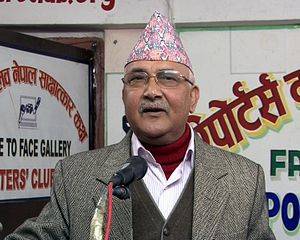One month after his visit to India, Nepal’s prime minister is currently in China, seeking investment and expanded relations with the neighbor to the north. Khadga Prasad Sharma Oli met with China’s top two leaders, President Xi Jinping and Premier Li Keqiang, on Monday, and addressed Renmin University and the Chinese business community on Tuesday. Oli also plans to attend the Boao Forum for Asia, China’s premier economic conference. He will spend a full week in China, from March 20 to 27.
Nepal’s relations with China have always lagged behind ties with India, for cultural, political, and geographical reasons. However, Kathmandu-New Delhi relations took a major hit when trade with India was effectively halted last year, in the wake of protests over Nepal’s new constitution. Nepal accused India of orchestrating a blockade, while India said protests near the border were preventing normal trade relations. During the crisis, China – Nepal’s only other neighbor – appeared as an attractive alternative trading partner. Last fall, for the first time ever, Nepal sought to import gasoline from China, the first concrete sign that Kathmandu would look to Beijing to decrease reliance on Indian trade.
Naturally, trade relations were the major subject of discussion during Oli’s visit to China this week. During a meeting with the Nepali prime minister, Xi spoke of speeding up negotiations on the creation of China-Nepal free trade area and said the two sides should increase their cooperation on connectivity and energy.
Oli also expressed his enthusiasm for China’s “Belt and Road” initiative, saying the project would be important for Nepal’s development. “Being the immediate neighbor of China, Nepal’s gain from this initiative will be remarkable,” he said in a speech at Renmin University in Beijing.
Along with Oli’s visit, China and Nepal signed agreements allowing Nepal to conduct foreign trade via Chinese ports. Currently, over 90 percent of Nepal’s trade with third countries passes through India; the new agreement paves the way for some of that to be diverted to Chinese transit hubs. However, those plans won’t come to fruition in the near future – if they ever do. Transportation infrastructure linking Nepal and China is minimal, thanks to the inhospitable terrain of the Himalayas. For nearly six months in 2015, China and Nepal didn’t even have a functional border crossing, thanks to lingering damage from the Gorkha earthquake.
As one outcome of Oli’s trip, Reuters reported that China and Nepal were looking into the possibility of a rail link between the two countries, but even that seems uncertain. The terrain is so inhospitable that Chinese media previously reported the planned rail link might involve the herculean task of tunneling under Mount Everest.
Hou Yanqi, a deputy head of the Asia Division at China’s Foreign Ministry, confirmed to Reuters that China was planning to extend the Qinghai-Tibet rail line from Shigatse in Tibet to Gyirong on Chinese side of the border with Nepal. But she noted that “a further extension from Gyirong [into Nepal] is an even longer-term plan.” Hou predicted that China and Nepal would eventually be connected by rail – at a point “far in the future.”
Other deals could have a more immediate impact. China has agreed to construct and provide loans for an international airport in Pokhara, Nepal, for example, as well as constructing a bridge spanning the Xiarwa River near the western end of the China-Nepal border. The two sides will also look into a free trade zone, as Xi mentioned on Monday.
Meanwhile, Oli encouraged Chinese businesses to invest in Nepal, saying that his country hoped to integrate its economy with China’s. “The global economy itself is well integrated with Chinese economy,” Oli told a gathering of Chinese and Nepalese business leaders on Tuesday. “Then, how can we remain aloof or afford of being delinked from these opportunities? We would surely like to reap benefit by integrating our economy in the most beneficial way. [sic]”
“Our doors are open for investment in almost every sector. These include manufacturing, hydropower, tourism, services, IT, mining, and agro based industries,” he added.”
While the deals signed this week will take years to actually have an impact on Nepal-China trade ties, they are already being celebrated as a step in reducing Nepal’s dependence on India. In an editorial, Nepal’s Himalayan Times wrote that the agreements “will greatly help Nepal diversify its trade and greatly reduce its economic vulnerabilities… PM Oli’s China visit has already proved successful, and will be long remembered by this nation for its far-reaching positive implications for Nepal.”
































